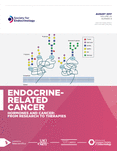Whole blood mRNA in prostate cancer reveals a four-gene androgen regulated panel
- Benjamin C Thomas1,2,
- Jonathan D Kay1,2,3,
- Suraj Menon4,5,
- Sarah L Vowler4,5,
- Sarah N Dawson4,
- Laura J Bucklow2,
- Hayley J Luxton2,3,
- Thomas Johnston1,2,
- Charlie E Massie1,6,
- Michelle Pugh7,
- Anne Y Warren8,
- Peter Barker9,
- Keith Burling9,
- Andy G Lynch10,
- Anne George1,
- Johanna Burge1,
- Marie Corcoran1,
- Sara Stearn1,
- Alastair D Lamb1,
- Naomi L Sharma1,
- Greg L Shaw1,11,
- David E Neal1,12 and
- Hayley C Whitaker1,2,3⇑
- 1Uro-Oncology Research Group, Cancer Research UK Cambridge Institute, Robinson Way, Cambridge, UK
- 2Biomarker Initiative, Cancer Research UK Cambridge Institute, Robinson Way, Cambridge, UK
- 3Molecular Diagnostics and Therapeutics Group, University College London, London, UK
- 4Bioinformatics and Statistics Core Facility, Cancer Research UK Cambridge Institute, Robinson Way, Cambridge, UK
- 5Astra Zeneca, 2 Riverside, Granta Park, Cambridge, UK
- 6Molecular and Computational Diagnostics Group, Cancer Research UK Cambridge Institute, Robinson Way, Cambridge, UK
- 7Genomics Core Facility, Cancer Research UK Cambridge Institute, Robinson Way, Cambridge, UK
- 8Department of Histopathology, Cambridge University Hospitals NHS Foundation Trust, Cambridge, UK
- 9National Institute for Health Research Cambridge Biomedical Research Centre Core Biochemistry Assay Laboratory, Cambridge University Hospitals NHS Foundation Trust, Cambridge, UK
- 10Computational Biology Group, Cancer Research UK Cambridge Institute, Robinson Way, Cambridge, UK
- 11University College Hospital at Westmoreland Street, London, UK
- 12Nuffield Department of Surgical Sciences, John Radcliffe Hospital, Headington, Oxford, UK
- Correspondence should be addressed to H Whitaker; Email: Hayley.Whitaker{at}ucl.ac.uk
Abstract
Due to increased sensitivity, the expression of circulating nucleotides is rapidly gaining popularity in cancer diagnosis. Whole blood mRNA has been used in studies on a number of cancers, most notably two separate studies that used whole blood mRNA to define non-overlapping signatures of prostate cancer that has become castration independent. Prostate cancer is known to rely on androgens for initial growth, and there is increasing evidence on the importance of the androgen axis in advanced disease. Using whole blood mRNA samples from patients with prostate cancer, we have identified the four-gene panel of FAM129A, MME, KRT7 and SOD2 in circulating mRNA that are differentially expressed in a discovery cohort of metastatic samples. Validation of these genes at the mRNA and protein level was undertaken in additional cohorts defined by risk of relapse following surgery and hormone status. All the four genes were downregulated at the mRNA level in the circulation and in primary tissue, but this was not always reflected in tissue protein expression. MME demonstrated significant differences in the hormone cohorts, whereas FAM129A is downregulated at the mRNA level but is raised at the protein level in tumours. Using published ChIP-seq data, we have demonstrated that this may be due to AR binding at the FAM129A and MME loci in multiple cell lines. These data suggest that whole blood mRNA of androgen-regulated genes has the potential to be used for diagnosis and monitoring of prostate cancer.
- Received 4 August 2016
- Accepted 10 August 2016
- Made available online as an Accepted Preprint 30 August 2016
- © 2016 Society for Endocrinology












